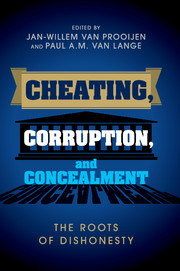
- Cited by 4
-
Cited byCrossref Citations
This Book has been cited by the following publications. This list is generated based on data provided by Crossref.
Hu, Chao Huang, Jinhao Wang, Qiandong Weare, Ethan and Fu, Genyue 2020. Truthful but Misleading: Advanced Linguistic Strategies for Lying Among Children. Frontiers in Psychology, Vol. 11, Issue. ,
Zhang, Na Guo, Mingxuan Jin, Chunhua and Xu, Zhen 2022. Effect of medical researchers’ creative performance on scientific misconduct: a moral psychology perspective. BMC Medical Ethics, Vol. 23, Issue. 1,
Vrij, Aldert Granhag, Pär Anders Ashkenazi, Tzachi Ganis, Giorgio Leal, Sharon and Fisher, Ronald P. 2022. Verbal Lie Detection: Its Past, Present and Future. Brain Sciences, Vol. 12, Issue. 12, p. 1644.
Grant, Ruth W. Katzenstein, Suzanne and Kennedy, Christopher 2023. How Could They Let This Happen? Cover Ups, Complicity, and the Problem of Accountability. Res Publica,
- Publisher:
- Cambridge University Press
- Online publication date:
- June 2016
- Print publication year:
- 2016
- Online ISBN:
- 9781316225608
- Subjects:
- Social Psychology, Political Sociology, Psychology, Sociology




